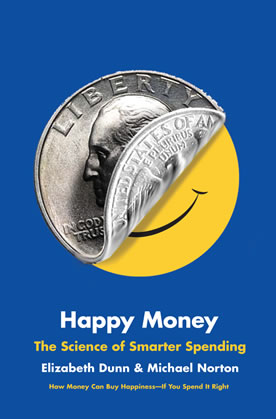
Happy Money tells how to bring more joy into your life through your purchases (based on scientific research). It’s not about how to increase your conspicuous consumption. It is about making conscious choices on how to transform your existing spending plans into something that will make you truly happier. And these concepts have appeal for both your personal and your business lives.
The five principles aren’t earth-shattering. In some cases you may have already had a hunch about them, but until now, would be hard-pressed to prove their value.
The five principles described are:
- Buy Experiences. Studies have shown that many purchases lead to buyer’s remorse, because the reality of your purchase falls short of the dream. Over time, you get used to your purchase – your short-term happiness doesn’t last. Contrast this with experiential memories – their pleasure increases over time. Experiences also connect us to others, while purchases keep us separate from others. In your business marketing, consider focusing your message on the pleasant experience clients have with your offerings (the happiness benefit) rather than the product/service you provide.
- Make It a Treat. If you regularly purchase the same item to bring your pleasure, you’re more likely to take it for granted. The first fresh-baked cookie tastes delicious. The second, is good, but not as amazingly delicious. The tenth, even less so. Too many, and it becomes a chore to eat more. Smaller, less-expensive, novel treats are more likely to bring you long-term happiness than a routine purchase. In your business marketing, consider turning a regular offering into something seasonal – something people will look forward to getting when the time is right.
- Buy Time. People tend to underestimate how much time things take, and often try to pack too much in too little time. The end result is much less happiness. Focus your purchases on time-savings opportunities to give you some quality time back into your life. By equating time = money, you enjoy time less, and therefore decrease your happiness quotient. By giving away time (by donating your time) you also create the feeling that you have more time in your life. In your business marketing, focus your message on tangible ways your offering can give people back more time into their busy days.
- Pay Now, Consume Later. Our culture encourages us to consume now, and pay later. This practice encourages spontaneous purchases (short-term pleasure) at a cost of increase stress when the bills arrive. As A.A. Milne writes in Winnie-the-Pooh: “Well,” said Pooh, “what I like best,” and then he had to stop and think. “Because although Eating Honey was a very good thing to do, there was a moment just before you began to eat it which was better than when you were, but he didn’t know what it was called.” It is often the anticipation is better than reality. So, to increase your enjoyment, defer a purchase to allow you more time to enjoy the possibilities that the purchase will bring. In fact, if you purchase something now, but wait to receive it, you’ll doubly win: you’ll delay gratification and when you do get the purchase, it’ll feel like a free gift. In your business marketing, consider an offering where people pay up-front for a regular purchase, but receive it a bit later – but with excitement surrounding its arrival.
- Invest in Others. Just as donating your time can create a feeling of having more time available, so too does donating money to owners create a feeling of wealth. Even better than simply donating anonymously, is to donate to someone specifically. Such a donation creates connection (see principle #1). In your business marketing, find opportunities to allow your customers to make a difference in their communities – or – provide a way for people to feel connected to others.
Why not invest in your own (business’s) long-term happiness?